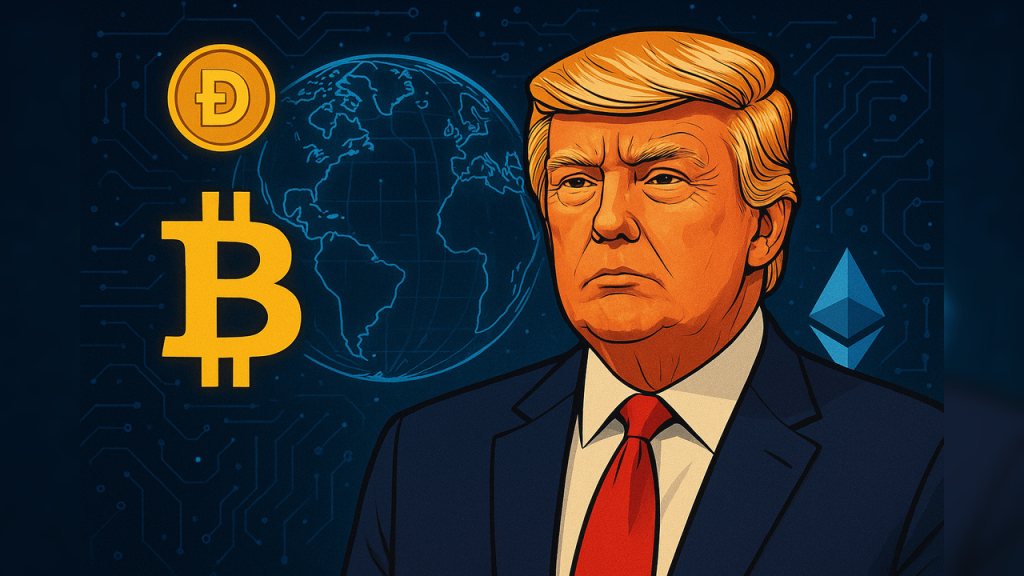Trump’s Crypto Crusade: How the Former U.S. President Is Reshaping the Digital Currency Narrative

Former U.S. President Donald Trump has emerged as a pivotal voice in the global cryptocurrency conversation, signaling a marked shift from his earlier skepticism toward digital assets. His recent endorsements, policy hints, and pro-innovation rhetoric have stirred both optimism and controversy across the financial landscape. As the 2024 political and economic climate continues to evolve, Trump’s embrace of cryptocurrency reflects a broader ideological movement toward decentralized finance and economic independence. This strategic alignment could redefine how digital assets intersect with politics, regulation, and the future of the U.S. financial system.
A Dramatic Turn in Trump’s Crypto Outlook
Donald Trump’s evolving stance on cryptocurrency has become one of the most notable reversals in recent political memory. During his presidency, he often criticized digital assets, labeling Bitcoin a “scam” and warning against its potential threat to the U.S. dollar. However, in recent years, his position has softened significantly. Now, Trump openly acknowledges the growing relevance of digital currencies and blockchain innovation, framing them as essential to America’s technological competitiveness.
This transformation mirrors the broader shift in conservative economic circles, where skepticism about digital money is giving way to pragmatic interest. For Trump, embracing crypto represents both a strategic and ideological pivot—one that appeals to younger, tech-savvy voters and pro-business constituencies alike.
Aligning Crypto Policy with Political Ambitions
Trump’s renewed enthusiasm for cryptocurrency is not just rhetoric—it’s a calculated move that ties directly into his broader political agenda. As he eyes a potential return to the White House, his campaign has made gestures toward supporting blockchain innovation, digital payments, and the inclusion of cryptocurrency donations.
By courting the crypto community, Trump is tapping into a rapidly expanding economic base that values financial sovereignty and reduced government oversight. Analysts suggest that this outreach may serve as a cornerstone of his economic platform, distinguishing him from regulatory-heavy opponents and positioning him as a champion of technological freedom.
Economic Implications and Market Reactions
The financial markets have responded energetically to Trump’s crypto-friendly posturing. Traders and investors view his statements as signals of potential policy leniency, particularly regarding digital asset regulation. Such expectations have fueled optimism among crypto enthusiasts, many of whom anticipate a more favorable environment for innovation under a future Trump administration.
In contrast, some financial watchdogs remain cautious. They argue that unchecked deregulation could expose the market to volatility and risk, especially given the speculative nature of many cryptocurrencies. Despite these warnings, market sentiment remains buoyant, reflecting confidence in the political and cultural momentum behind digital assets.
Trump’s Vision for American Technological Leadership
At the heart of Trump’s crypto advocacy lies a broader narrative: ensuring U.S. dominance in emerging technologies. His message resonates with the idea that blockchain, artificial intelligence, and decentralized finance (DeFi) could shape the next frontier of economic growth.
By supporting crypto innovation, Trump positions himself as a defender of free-market capitalism in the digital era. His rhetoric underscores the need for the U.S. to lead—not regulate out of fear—an industry that could redefine global financial infrastructure. This aligns with his larger message of “America First,” but reimagined for a digital age.
Challenges Ahead: Regulation, Trust, and Volatility
Despite Trump’s favorable rhetoric, significant challenges remain. Cryptocurrency continues to face scrutiny over security breaches, environmental concerns, and illicit transactions. Regulatory agencies such as the SEC and Federal Reserve remain divided on how best to integrate these assets within existing financial systems.
If Trump returns to power, striking a balance between innovation and accountability will be essential. Overly aggressive deregulation could invite instability, while excessive oversight could stifle progress. The challenge lies in crafting a framework that promotes transparency without constraining creativity.
Conclusion
Donald Trump’s embrace of cryptocurrency marks a defining moment in the evolution of both digital finance and American politics. Once a vocal critic, he now represents a growing faction of leaders who see crypto not as a threat, but as an opportunity to reshape global economic power dynamics. His approach—rooted in nationalism, entrepreneurship, and disruption—could propel the U.S. into a new era of digital leadership. Whether this vision materializes depends on how effectively rhetoric translates into policy and whether innovation can coexist with financial stability.




